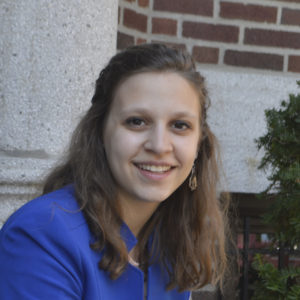This is part 2 in a 3-part series about politics, identity and Jewish community on college campuses. Click here to view part 1, and here to view part 3.
When Lindsey Bressler got the first text, it was Nov. 8, 2016 — Election Day. She was watching the news with her peers at Northeastern University, crying. And while she was upset about the election, there was something else going on, too. Her friends on the local Hillel’s executive student board had just been fired from their positions and were now banned from seeking additional leadership positions with the organization for a year.
“I felt pretty surprised about the results of the general election that night,” Bressler said, who was in her fourth year of a five-year program at the time. “But with the Hillel board firings, I didn’t feel surprised at all. It just felt like it matched the mood of the night.”
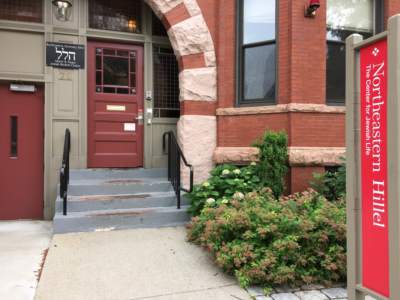
Bressler, now an alum working for the Peace Corps in Tanzania, spoke via emailed voice recordings in August. Soon after joining Hillel as a freshman, she began to realize her passion for social justice, including her support for Palestinian rights, alienated her from the rest of the community.
That’s what motivated her, and other student leaders in Hillel, to write a letter to Hillel staff asking for numerous changes to programming, including a more balanced conversation around Israel. This letter, sent in October 2016, was the reason that all five members of the student executive board were abruptly fired a month later.
But for many Jewish students at Northeastern, this is just a continuation of an old story — one that began long before any current students even arrived on campus. Over the years, it’s involved accusations of anti-Semitism from external Jewish organizations and the formation of a new student organization, the Jewish Student Union. Above all, though, it’s a story about students who have felt consistently disregarded by the people whose job it is to help them.
“These were students who simply wanted a greater say in their own Hillel, greater involvement, and a wider array of programming, and many of them weren’t against Hillel or even necessarily politically left on Israel,” said Dov Waxman, a Northeastern Jewish studies professor. “In this case, it was really about, what’s Hillel for? Whose interests is it serving? What was happening at Northeastern — the students were saying, ‘It’s supposed to be serving us.’”
Others in the community had these same questions, including former Jewish studies professor Jennifer Sartori, who left the university in the summer of 2017. Part of the reason she began helping students write the letter, she said, was because students had told her over the years that they weren’t feeling comfortable at Hillel.
“[Jewish studies professors] would hear from students that Hillel had become a place that was ‘all Israel all the time,’ and with a very particular slant,” Sartori said. “It was a frustration from students and staff members — there’s so many other things about Jewishness in addition to Israel.”
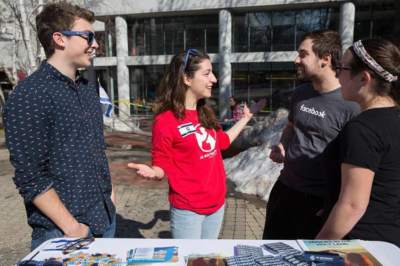
Sartori said once she began actively working with the students who wrote the letter, she realized it wasn’t only about Israel. It was also about the students’ ability to create the community they wanted on campus.
“What [students] were telling me about how they were being treated just made me so angry,” Sartori said. “Yes, part of it was about Israel, but a lot more of it was about student leadership and student leadership being undercut, and a frustration about how they were being treated both as human beings and as student leaders. ”
Back to the beginning
In 2012, a series of videos were released by an organization called Americans for Peace and Tolerance. One featured Northeastern political science and international affairs professor Denis Sullivan, who teaches courses on Middle Eastern politics and co-directs the university’s Middle East Center. The series, which included anonymous interviews with students and footage from Sullivan’s lectures, accused Sullivan of anti-Semitism and the university of covering it up. It also claimed that the Jewish studies program was not supportive of Jewish students, and that the campus was a hostile environment for Jews.
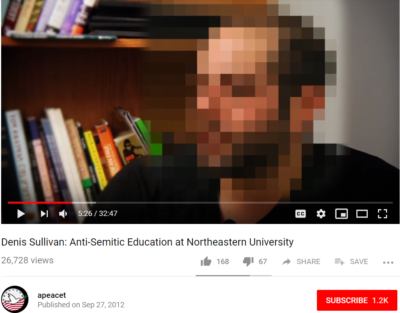
The organization states that its mission is to identify and educate on instances of extremist policies interfering in American life, but the Anti-Defamation League and the Jewish Community Relations Council have condemned multiple statements the group has made in past years.
Regardless, the claims made an impact — numerous university employees in the school’s Center for Spirituality, Dialogue, and Service were fired, and the center was restructured. This was the year before Nadav David arrived on campus as a freshman. Now a 2017 alum who was heavily involved in the Jewish community, David said the scars left by those videos influenced his own campus experience.
“Northeastern administration changed the way they interact with Jewish students … because they got really scared that anything they would do would be seen as anti-Semitic,” David said. “This is a really, really important story that I think people are missing. The students don’t know about it because they weren’t here, but staff and administration, professors — they absolutely remember it.”
David is right, Sartori said. Before the videos, Hillel’s executive director had sat on the Jewish studies advisory committee and the university’s Holocaust Awareness Week planning group. Jewish studies program director Lori Lefkovitz attended Hillel advisory board meetings as well. But slowly, Sartori said, Hillel staff began to distance themselves from the Jewish studies program.
The executive director left both the Jewish studies committee and the Holocaust Awareness group. Hillel stopped cosponsoring events or promoting academic programs, including a five-week study abroad trip to Israel led by Waxman and Lefkovitz. The trip’s itinerary includes time in the West Bank and visits with Palestinians, including in a refugee camp.
Some members of the Hillel advisory board actively and openly distrust the Jewish studies department. One of them is Ira Krull, a retired Northeastern professor who has been involved with the board off and on since his arrival on campus in 1979. He believes the university is anti-Semitic, and that the Jewish studies department is neutral at their best and anti-Israel at their worst.
“[Hillel] is a success story, and the Jewish studies program is jealous and upset about it. They would like Hillel to disappear tomorrow,” Krull said.
Lefkovitz, the Jewish studies program director, said she was disappointed with Hillel’s distance from the Jewish studies program.
“I’m sad,” Lefkovitz said. “It’s sad for me, that this wonderful Jewish community and the very fine faculty that we have can’t be mutually supportive. We are at our best when we can embrace diversity and program broadly.”
But when individuals do try to embrace diversity, it’s often halted by Hillel, as Rabbi Elisha Herb discovered when he took a job at the university’s Center for Spirituality, Dialogue, and Service in 2014. At the time, Herb’s position was joint between the university and Hillel, although only the university paid his salary. He taught classes at Hillel, led their services, and provided other resources to their students and staff.
That spring, Northeastern’s Students for Justice in Palestine chapter brought a Boycott, Divestment, Sanctions (BDS) resolution to the student government. Students from Hillel and from Huskies for Israel, Northeastern’s pro-Israel group, approached Herb and asked if they could talk with students from SJP about the issue.
So, he set up a meeting. And then, students wanted more meetings. Eventually, Herb said, students were forming friendships between groups. But once local Hillel staff heard about the program, they dropped their affiliation with Herb, removed his name from their website, and no longer allowed him to lead services or teach Torah at the Hillel building. When Herb asked for answers, he was told by the executive director it was because of the Standards of Partnership set by Hillel International — “students, partners, speakers and other stakeholders” may not “partner with, house or host organizations, groups or speakers” who support the BDS movement.
“I did not think it was ethical, I did not think it was supportive of the students, and most importantly, I did not think it actually fit in with Hillel’s stated mission — which is to create a venue for students to explore their Jewish identity,” Herb said. “If you just aren’t going to allow certain conversations under your roof, then you need to change your mission statement.”
Through Herb’s two years on campus, these conversations between students continued despite Hillel’s disapproval. In May 2016, Herb graduated from rabbinical school and took a job elsewhere, leaving the campus. Remembering those years now, he said he doesn’t regret anything.
“For the first time in my Jewish life, I felt like, ‘Oh, these are consequences for doing what you believe is right,’” Herb said. “Part of me felt like, ‘Okay, I did what I think is right, and something happened. That’s okay with me.’”
Problems stack up
Tensions came to a head in September 2016, when a Hillel donor paid for Israeli activist Itamar Marcus to speak on campus. Marcus directs an organization called Palestinian Media Watch, which focuses on analyzing Palestinian television and other media for anti-Semitism or incitement to violence against Jews.
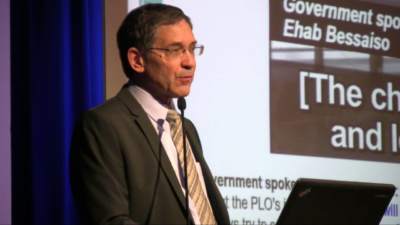
Marcus is a former president of the Central Fund of Israel, an organization highlighted in a New York Times article for using its tax exemption to fund settlement projects in the West Bank, where Marcus lives in the settlement Efrat.
Although the event was placed on the student calendar, only two or three students attended, likely because the event was in the middle of a school day. The rest of the attendees were donors.
“It was set to be a fundraiser for other people looking to support the Hillel community. I don’t know if it was aimed at students,” said Leah Beight, now a Northeastern fourth-year and a board member at Hillel at that time. “But I know that was an event that rattled some people, and it did not sit well with students [who] just felt that [Marcus] didn’t represent their values.”
Nadav David, who was a senior at Northeastern when this took place, said this was one final straw in a long list of problems.
“People had expressed that Hillel was acting more as a representative of the pro-Israel community on campus rather than the center for Jewish life on campus,” David said. “There had been a lot of disregard, actually, for people’s Jewish identity development and Jewish learning.”
So, David gathered a group of friends: current and former Hillel student board members Jackie Firsty and Lindsey Bressler, Hillel International Student Cabinet member Ross Beroff and the Hillel student president at the time, David Iken.
Beroff, the International Student Cabinet member, was tired of seeing his friends continually frustrated over their lack of power as student leaders.
“I wanted to help the students,” Beroff said. “I cared about Jewish life on campus and making it a safe, thriving environment for these Jews to become leaders in their own way, to find meaningful Jewish experiences.”
So, the group decided to write the letter to local Hillel staff and its advisory committee, outlining the three major problems they saw in their Jewish community — transparency and accountability between students, staff and donors; an unbalanced conversation around Israel; and a lack of Jewish learning and religious opportunities. They also proposed solutions to each problem, suggesting that a student sit on the advisory board alongside the donors and asking that Hillel make more of an effort to partner with Jewish Studies.
Then, on Oct. 28, 2016, the group sent the letter, along with more than 100 signatures, to Hillel staff, the advisory committee, and a few members of Northeastern’s administration. The signatures included current students, alumni, and almost every member of Hillel’s executive and general student boards.
The staff was blindsided. They called a private meeting with the executive and general student boards. In the meeting, they accused students of harassing and misleading others into signing the letter and of spreading false gossip about staff. Then, they disbanded the executive student board, leaving the general board intact and saying they planned to restructure the student leadership system. Braverman, the executive director at the time, did not attend the meeting. She could not be reached for comment.
Krull, the Hillel board member, remembers it clearly. For him, this was an issue of power — students were “too big for their britches,” and wanted to “flex the muscles they didn’t have.”
He was sure students had convinced others to sign the letter because he said he couldn’t imagine 100 students were really that unhappy. He said he agreed with Braverman’s decision to ask the student leadership to leave.
“[Students] thought they were going to become Jewish student activists and get control of Hillel and that was never going to happen,” Krull said.
During this time, David and other members of the initial letter-writing group met with administrators at Hillel International and the university. Nothing changed, even after a student representative from Northeastern’s Student Government Association, which oversees campus organizations, said in an email that the disbanding of the board by an external party was not allowed.
The three Northeastern Hillel staff members at this time both declined to comment, and two left by the end of the year along with Braverman, the executive director. At the end of the 2017 school year, Hillel had one staff member.
“I feel like it’s a cycle that doesn’t really end,” Bressler said. “The people who want to keep things the way that they are and the way that they have been will be there much longer than any idealistic students will be.”
But change was coming. A new student organization, the Jewish Student Union, was slowly taking shape and, whether they knew it or not, the community was poised on the edge of a new chapter.
Hannah Bernstein is a student at Northeastern University and a New Voices reporting fellow.
Editor’s note: Hannah Bernstein was present in 2016 when some of these events took place. While she signed the initial letter, she had no further involvement in the situation, aside from participating in Jewish campus events as a community member. Additionally, she attended Hillel International’s Engagement Institute in August 2017. She began working on this story in May 2017.
Featured image credit: Felix Mittermeier, Pixabay.com.

